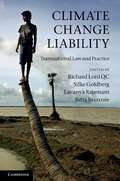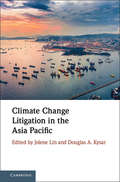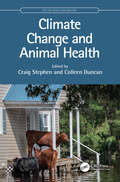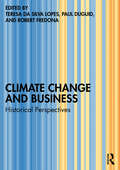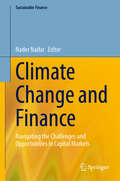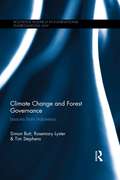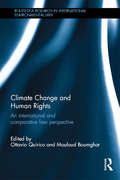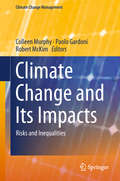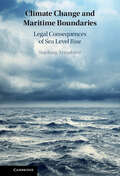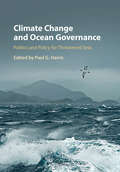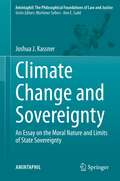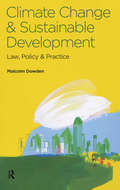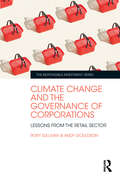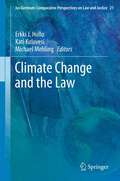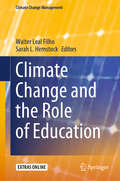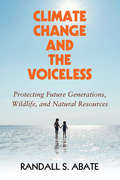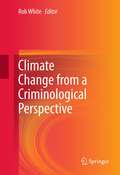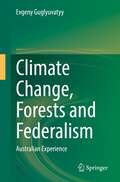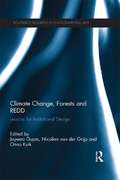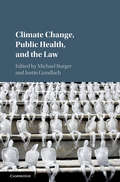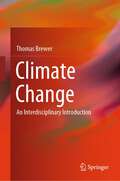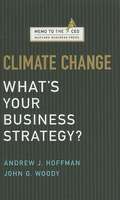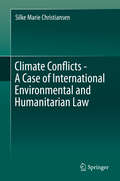- Table View
- List View
Climate Change Liability
by Richard Lord Jutta Brunnée Lavanya Rajamani Silke GoldbergAs frustration mounts in some quarters at the perceived inadequacy or speed of international action on climate change, and as the likelihood of significant impacts grows, the focus is increasingly turning to liability for climate change damage. Actual or potential climate change liability implicates a growing range of actors, including governments, industry, businesses, non-governmental organisations, individuals and legal practitioners. Climate Change Liability provides an objective, rigorous and accessible overview of the existing law and the direction it might take in seventeen developed and developing countries and the European Union. In some jurisdictions, the applicable law is less developed and less the subject of current debate. In others, actions for various kinds of climate change liability have already been brought, including high profile cases such as Massachusetts v. EPA in the United States. Each chapter explores the potential for and barriers to climate change liability in private and public law.
Climate Change Liability
by Richard Lord Jutta Brunnée Lavanya Rajamani Silke GoldbergAs frustration mounts in some quarters at the perceived inadequacy or speed of international action on climate change, and as the likelihood of significant impacts grows, the focus is increasingly turning to liability for climate change damage. Actual or potential climate change liability implicates a growing range of actors, including governments, industry, businesses, non-governmental organisations, individuals and legal practitioners. Climate Change Liability provides an objective, rigorous and accessible overview of the existing law and the direction it might take in seventeen developed and developing countries and the European Union. In some jurisdictions, the applicable law is less developed and less the subject of current debate. In others, actions for various kinds of climate change liability have already been brought, including high profile cases such as Massachusetts v. EPA in the United States. Each chapter explores the potential for and barriers to climate change liability in private and public law.
Climate Change Litigation in the Asia Pacific
by Douglas A. Kysar Jolene LinThis is the first scholarly examination of climate change litigation in the Asia Pacific region. Bringing legal academics and lawyers from the Global South and Global North together, this book provides rich insights into how litigation can galvanize climate action in countries including Pakistan, Indonesia, Malaysia and China. Written in clear and accessible language, the fourteen chapters in this book shed light on the important question of how litigation may unfold as a potential regulatory pathway towards decarbonization in the world's most populous region.
Climate Change and Animal Health (CRC One Health One Welfare)
by Colleen Duncan Craig StephenThis benchmark publication assembles information on the current and anticipated effects of climate change on animal health. It empowers educators, managers, practitioners, and researchers by providing evidence, experience, and opinions on what we need to do to prepare for, and cope with, the largest threat ever to have faced animals on this planet. With expert contributors from across the globe, the text equips the reader with information and means to develop sustainable adaptation or mitigation actions. After introducing animal health in a climate change context, chapters look at specific animal health impacts arising from climate change. The book concludes with suggestions on teachable and actionable ideas that could be used to mobilize concepts provided into education or advocacy. This book was written amid the COVID-19 pandemic and in the face of ever-increasing reports of on-the-ground, real-life climate impacts. Large scale wildfire and ocean heat waves killed unprecedented numbers of animals while droughts in some areas and floods in others displaced thousands of livestock and made food scarce for even more. Climate change is real, and it is here. How we respond will have profound implications for people, biodiversity, welfare, conservation, societies, economies and ecosystems. Today's veterinary educators are awakening to the need to adapt and train a new generation of animal health professions who can understand and plan for climate change, and this book is an essential resource.
Climate Change and Business: Historical Perspectives
by Paul Duguid Robert Fredona Teresa da Silva LopesClimate change is the greatest market failure in world history and thus the most urgent challenge in the world of business for the foreseeable future. This book brings together experts to shed light on the historical impact of business on climate change and of climate change on business.The book shows how corporate responses to climate change emerged out of earlier environmental concerns, regulatory frameworks, and in many cases already established business strategies. Contributors to the book analyse the evolution of business strategies to navigate environmental challenges even before climate crisis was widely recognised as an urgent concern.The historical insights presented by this book will be essential reading for business historians, as well as students, scholars, and reflective practitioners with an interest in the environment, political economy, business strategy, and risk management.
Climate Change and Finance: Navigating the Challenges and Opportunities in Capital Markets (Sustainable Finance)
by Nader NaifarFinancial markets play a critical role in climate finance as they are a major source of funding for many of the projects and initiatives aimed at addressing climate change. For instance, banks and investors can provide loans and capital to companies that are developing renewable energy projects, building energy-efficient infrastructure, or implementing climate-smart agricultural practices. Moreover, the importance of climate finance in financial markets goes beyond just funding environmental initiatives. Investors and financial institutions are increasingly factoring in climate risks and opportunities into their decision-making processes, including assessing the financial risks posed by climate change and the potential impact of new regulations and policies aimed at reducing greenhouse gas emissions.This book is a collection of recent developments in climate change and climate finance. As the global community seeks to address the impacts of climate change, financial institutions are being called upon to play a larger role in supporting the transition to a sustainable economy. This includes incorporating climate risks into investment decisions, developing new financial products that support climate-friendly investments, and promoting greater transparency and accountability in the financial sector. The book provides a comprehensive analysis of how climate change is impacting the global financial system and explores the potential solutions that can help address these challenges. The contributions aim to examine the complex interplay between climate change and finance, and the potential for innovative financial instruments and policies to support the transition to a low-carbon economy.
Climate Change and Forest Governance: Lessons from Indonesia (Routledge Research in International Environmental Law)
by Rosemary Lyster Simon Butt Tim StephensDeforestation in tropical rainforest countries is one of the largest contributors to human-induced climate change. Deforestation, especially in the tropics, contributes around 20 per cent of annual global greenhouse gas emissions, and, in the case of Indonesia, amounts to 85 per cent of its annual emissions from human activities. This book provides a comprehensive assessment of the emerging legal and policy frameworks for managing forests as a key means to address climate change. The authors uniquely combine an assessment of the international rules for forestry governance with a detailed assessment of the legal and institutional context of Indonesia; one of the most globally important test case jurisdictions for the effective roll-out of ‘Reduced Emissions from Deforestation and Degradation’ (REDD). Using Indonesia as a key case study, the book explores challenges that heavily forested States face in resource management to address climate mitigation imperatives, such as providing safeguards for local communities and indigenous peoples. This book will be of great relevance to students, scholars and policymakers with an interest in international environmental law, climate change and environment and sustainability studies in general.
Climate Change and Human Rights: An International and Comparative Law Perspective (Routledge Research in International Environmental Law)
by Ottavio Quirico Mouloud BoumgharDo anthropogenic greenhouse gas emissions affect human rights? Should fundamental rights constrain climate policies? Scientific evidence demonstrates that anthropogenic greenhouse gas emissions contribute to increasing atmospheric temperatures, soon passing the compromising threshold of 2° C. Consequences such as Typhoon Haiyan prove that climate alteration has the potential to significantly impair basic human needs. Although the United Nations Framework Convention on Climate Change and human rights regulatory regimes have so far proceeded separately, awareness is arising about their reciprocal implications. Based on tripartite fundamental obligations, this volume explores the relationship between climate change and interdependent human rights, through the lens of an international and comparative perspective. Along the lines of the metaphor of the ‘wall’, the research ultimately investigates the possibility of overcoming the divide between universal rights and climate change, and underlying barriers. This book aims to be a useful resource not only for practitioners, policymakers, academics, and students in international, comparative, environmental law and politics and human rights, but also for the wider public.
Climate Change and Its Impacts: Risks and Inequalities (Climate Change Management)
by Colleen Murphy Paolo Gardoni Robert McKimResponding to a need for a deeper and more nuanced understanding of the consequences of climate change, this book brings experts in climate science, engineering, urban planning, and conservation biology into conversation with scholars in law, geography, anthropology and ethics. It provides insights into how climate change is conceptualized in different fields. The book also aims to contribute to developing successful and multifaceted strategies that promote global, intergenerational and environmental justice. Among the topics addressed are the effects of climate change on the likelihood and magnitude of natural hazards, an assessment of civil infrastructure vulnerabilities, resilience assessment for coastal communities, an ethical framework to evaluate behavior that contributes to climate change, as well as policies and cultural shifts that might help humanity to respond adequately to climate change.
Climate Change and Maritime Boundaries: Legal Consequences of Sea Level Rise
by Snjólaug ÁrnadóttirCoastal States exercise sovereignty and sovereign rights in maritime zones, measured from their coasts. The limits to these maritime zones are bound to recede as sea levels rise and coastlines are eroded. Furthermore, ocean acidification and ocean warming are increasingly threatening coastal ecosystems, which States are obligated to protect and manage sustainably. These changes, accelerating as the planet heats, prompt an urgent need to clarify and update the international law of maritime zones. This book explains how bilateral maritime boundaries are established, and how coastal instability and vulnerable ecosystems can affect the delimitation process through bilateral negotiations or judicial settlement. Árnadóttir engages with core concepts within public international law to address emerging issues, such as diminishing territory and changing boundaries. She proposes viable ways of addressing future challenges and sets out how fundamental changes to the marine environment can justify termination or revision of settled maritime boundaries and related agreements.
Climate Change and Ocean Governance: Politics and Policy for Threatened Seas
by Paul G. HarrisClimate Change and Ocean Governance brings together authors from political science and cognate disciplines to examine the political and policy dimensions of climate change for our oceans. The environmental, social and economic consequences of oceanic change present tremendous challenges for governments and other actors. New and innovative policies for governing oceans and seas - and for managing vital marine resources - have never been more important. Existing national and international institutions for marine governance that were created when oceanic conditions were relatively static may not be adequate for a future characterized by continuous oceanic change. Responses to oceanic change will result in winners and losers, and thus will involve politics in all its manifestations. This book reveals the unavoidable connections between climate change, the oceans, and questions of governance. It provides valuable lessons for researchers, policymakers and activists concerned about governing oceanic change into the future.
Climate Change and Sovereignty: An Essay on the Moral Nature and Limits of State Sovereignty (AMINTAPHIL: The Philosophical Foundations of Law and Justice #10)
by Joshua J. KassnerThis book offers a meditation on global justice and international political and legal theory. The author assesses positions in the current debate over the moral nature and limits of sovereignty. He also evaluates the normative role sovereignty ought to play in the practical deliberations of states. The discussion moves from theory to practice. Coverage starts with a conceptual analysis and moral critique. It then goes on to consider specific issues. These include global climate change, secession and self-determination, human rights, global distributive justice, and immigration. Readers will learn how states ought to deliberate about and respond to these important topics. They will also discover potential institutional structures better suited to resolving these issues while also respecting state sovereignty. In working through each specific challenge, the author provides insight into how we ought to think about challenges facing the international community and the potential for properly constructed institutions to function as solutions. These analyses also provide a valuable critical lens to assess the actions (and omissions) of our leaders. In the end, the book argues that domestic governments and regional bodies should be responsible for implementing the chosen course of action. This would provide a basis for holding political leaders more accountable.
Climate Change and Sustainable Development: Law, Policy and Practice
by Malcolm DowdenWith the profile of environmental issues at an all-time high, this book provides a much needed examination of the related effects of these issues on the property industry. Within the property industry at the moment it is difficult to assume an overview of these issues, and to properly assess the implications of climate change for commercial property. This is the first book that pulls together the different elements of climate change into one coherent argument, explaining what needs to be done to ensure the future of the property market. The main issues discussed are: mitigation, adaptation, energy efficiency and property valuation, in addition to providing informed commentary on the laws and practical guidance to practitioners.
Climate Change and the Governance of Corporations: Lessons from the Retail Sector (The Responsible Investment Series)
by Rory Sullivan Andy GouldsonClimate change represents the most important environmental challenge of our time. Organisations are responding by implementing governance processes and taking action to reduce their own emissions and the emissions from their supply chains and value chains. Yet very little is known about how these efforts contribute to reducing greenhouse gas emissions (if, indeed, they make any substantive contribution at all) or about how they might be harnessed to deliver more ambitious reductions in emissions. This book explains when and where particular forms of governance intervention – including internal governance processes and external governance pressures – are likely to impact climate change. From this analysis, it offers practical proposals on the climate policy frameworks that need to be in place to facilitate or accelerate changes in corporate behaviour. The book is truly global: it focuses on the world’s 25 largest retailers (including Walmart, Tesco, Carrefour, Sears and Aldi) and is based on detailed interviews with senior managers from these corporations, and with key global and national NGOs, corporate responsibility experts, politicians and regulators. These interviews provide clear insights into how external governance pressures and actions (public opinion, regulation, incentives) interact with internal governance conditions (management systems and processes, corporate policies, board/CEO leadership) to change and shape corporate actions on climate change and, in turn, the climate change impacts of these corporations. This book can be used as a core reference for any courses dealing with corporate governance and business strategy, in particular those relating to climate change and to environmental management more generally. It is also of relevance to business practitioners, public policy makers, investors and NGOs interested in ensuring that companies play a constructive role in the transition to a low-carbon economy.
Climate Change and the Law (Ius Gentium: Comparative Perspectives on Law and Justice #21)
by Michael Mehling Kati Kulovesi Erkki J. HolloClimate Change and the Law is the first scholarly effort to systematically address doctrinal issues related to climate law as an emergent legal discipline. It assembles some of the most recognized experts in the field to identify relevant trends and common themes from a variety of geographic and professional perspectives. In a remarkably short time span, climate change has become deeply embedded in important areas of the law. As a global challenge calling for collective action, climate change has elicited substantial rulemaking at the international plane, percolating through the broader legal system to the regional, national and local levels. More than other areas of law, the normative and practical framework dedicated to climate change has embraced new instruments and softened traditional boundaries between formal and informal, public and private, substantive and procedural; so ubiquitous is the reach of relevant rules nowadays that scholars routinely devote attention to the intersection of climate change and more established fields of legal study, such as international trade law. Climate Change and the Law explores the rich diversity of international, regional, national, sub-national and transnational legal responses to climate change. Is climate law emerging as a new legal discipline? If so, what shared objectives and concepts define it? How does climate law relate to other areas of law? Such questions lie at the heart of this new book, whose thirty chapters cover doctrinal questions as well as a range of thematic and regional case studies. As Christiana Figueres, Executive Secretary of the United Nations Framework Convention on Climate Change (UNFCCC), states in her preface, these chapters collectively provide a "review of the emergence of a new discipline, its core principles and legal techniques, and its relationship and potential interaction with other disciplines."
Climate Change and the Role of Education (Climate Change Management)
by Walter Leal Filho Sarah L. HemstockThis book offers insights into the educational dimensions of climate change and promotes measures to improve education in this context. It is widely believed that education can play a key role in finding global solutions to many problems related to climate change. Indeed, education as a process not only helps young people to better understand and address the impact of global warming, but also fosters better attitudes and behaviours to aid efforts towards mitigating climate change and adapting to a changing environment. But despite the central importance of education in relation to climate change, there is a paucity of publications on this theme. Against this background, the book focuses on the educational aspects of climate change and showcases examples of research, projects and other initiatives aimed at educating various audiences. It also provides a platform for reflections on the role education can play in fostering awareness on a changing climate. Presenting a wide range of valuable lessons learned, which can be adapted and replicated elsewhere, the book appeals to educators and practitioners alike.
Climate Change and the Voiceless: Protecting Future Generations, Wildlife, and Natural Resources
by Randall S. AbateFuture generations, wildlife, and natural resources - collectively referred to as 'the voiceless' in this work - are the most vulnerable and least equipped populations to protect themselves from the impacts of global climate change. While domestic and international law protections are beginning to recognize rights and responsibilities that apply to the voiceless community, these legal developments have yet to be pursued in a collective manner and have not been considered together in the context of climate change and climate justice. In Climate Change and the Voiceless, Randall S. Abate identifies the common vulnerabilities of the voiceless in the Anthropocene era and demonstrates how the law, by incorporating principles of sustainable development, can evolve to protect their interests more effectively. This work should be read by anyone interested in how the law can be employed to mitigate the effects of climate change on those who stand to lose the most.
Climate Change from a Criminological Perspective
by Rob WhiteFew would dispute the power of climate change to lead to profoundly destructive weather events. At the same time, the possibility of climate change as a consequence--or even a cause--of criminal events is far less recognized. As the earth grows warmer, issues regarding land use, water rights, bio-security, and food production and distribution will continue to have far-reaching impact, and produce more opportunity for offenses by individuals and groups as well as political and corporate entities. In Climate Change from a Criminological Perspective, a panel of pioneering green criminologists investigates an increasingly complex chain of ecological causes and effects. Illegal acts are analyzed as they contribute to environmental decline (e.g., wildlife poaching) or result from ecological distress (e.g., survival-related theft). Regulatory and other interventions are critiqued, concepts of environmental harm refined, and new research methodologies called for. And while individual events described are mainly local, the contributors keep the global picture, and substantial questions about human rights and social relationships, firmly in mind. Topics featured include: Global warming as corporate crime. Climate change and the courts: U.S. and global views. Climate change, natural disasters, and gender inequality. The roles and responsibilities of environmental enforcement networks. A sociocultural perspective on climate change denial. PLUS: instructive in-depth chapters on criminological aspects of Hurricane Katrina and the Japanese nuclear disaster. A volume of considerable timeliness and vision, Climate Change from a Criminological Perspective will be read and discussed, and will inspire action, by researchers in criminology, criminal justice, environmental studies, and related disciplines, as well as policymakers.
Climate Change, Capitalism, and Corporations
by Christopher WrightClimate change is one of the greatest threats facing humanity, a definitive manifestation of the well-worn links between progress and devastation. This book explores the complex relationship that the corporate world has with climate change and examines the central role of corporations in shaping political and social responses to the climate crisis. The principal message of the book is that despite the need for dramatic economic and political change, corporate capitalism continues to rely on the maintenance of 'business as usual'. The authors explore the different processes through which corporations engage with climate change. Key discussion points include climate change as business risk, corporate climate politics, the role of justification and compromise, and managerial identity and emotional reactions to climate change. Written for researchers and graduate students, this book moves beyond descriptive and normative approaches to provide a sociologically and critically informed theory of corporate responses to climate change.
Climate Change, Forests and Federalism: Australian Experience
by Evgeny GuglyuvatyyClimate change is one of the most serious global challenges facing humankind. Climate change has enormous environmental and economic implications, and finding a solution is a daunting task. The purpose of this book is to look at the global problem of climate change through the prism of an individual country's attempt to tackle this problem.This book begins with a discussion of the origins of climate change and the evolution of the international response to climate change. Key climate change mitigation actions and policies are considered to provide the necessary framework for analysing Australia's approach to climate change. Australia's climate change policy development is considered from a historical perspective. The book traces the evolution of the response to climate change, focusing on Australia as one of the Federal countries unable to adequately reduce greenhouse gas emissions due to the systematic failure of the Australian government to develop a common and effective approach to the problem of climate change. The book will be of interest to scholars and students of environmental law and the contemporary International and Australian climate change law.
Climate Change, Forests and REDD: Lessons for Institutional Design (Routledge Research in International Environmental Law)
by Joyeeta Gupta Nicolien van der Grijp Onno KuikA search for new methods for dealing with climate change led to the identification of forest maintenance as a potential policy option that could cost-effectively reduce greenhouse gas emissions, with the development of measures for Reducing Emissions from Deforestation and Forest Degradation (REDD). This book explores how an analysis of past forest governance patterns from the global through to the local level, can help us to build institutions which more effectively deal with forests within the climate change regime. The book assesses the options for reducing emissions from deforestation in developing countries under the international climate regime, as well as the incentives flowing from them at the national and sub national level and examines how these policy levers change human behaviour and interface with the drivers and pressures of land use change in tropical forests. The book considers the trade-offs between certain forestry related policies within the current climate regime and the larger goal of sustainable forestry. Based on an assessment of existing multi-level institutional forestry arrangements, the book questions how policy frameworks can be better designed in order to effectively and equitably govern the challenges of deforestation and land degradation under the global climate change regime. This book will be of particular interest to students and scholars of Law and Environmental Studies.
Climate Change, Public Health, and the Law
by Michael Burger Justin GundlachClimate Change, Public Health, and the Law provides the first comprehensive explication of the dynamic interactions between climate change, public health law, and environmental law, both in the United States and internationally. Responding to climate change and achieving public health protections each require the coordination of the decisions and behavior of large numbers of people. However, they also involve interventions that risk compromising individual rights. The challenges involved in coordinating large-scale responses to public health threats and protecting against the invasion of rights, makes the law indispensable to both of these agendas. Written for the benefit of public health and environmental law professionals and policymakers in the United States and in the international public health sector, this volume focuses on the legal components of pursuing public health goals in the midst of a changing climate. It will help facilitate efforts to develop, improve, and carry out policy responses at the international, federal, state, and local levels.
Climate Change: An Interdisciplinary Introduction
by Thomas BrewerThis textbook introduces and explains the issues around climate change and its mitigation. It includes topics across disciplines and can be used as a single-volume text by students studying a range of subjects. Among the topics included are: ·How to adopt significant mitigation measures now to avoid the most catastrophic long-term consequences of climate change.·Reducing the rates of highly potent, short-lived emissions of methane gas and black carbon particulates—reductions that are necessary to meet the temperature targets of the Paris Agreements.·Implementing wide-ranging adaptation measures to reduce the deaths and economic costs of extreme heat waves, droughts, wildfires, hurricanes, and floods.·Recognizing the unusually rapid warming in the Arctic, which is disrupting weather patterns in the northern hemisphere and currents in the Atlantic Ocean, causing world-wide sea-level rise, and also causing methane leaks in the Arctic region—leaks that could eventually lead to irreversible global warming consequences. Meeting these challenges effectively requires action by both governments and businesses. The book examines the national and local governmental policies—and business practices—that are needed in sector-specific chapters. An objective of the book is to inform readers about specific problems resulting from climate change—and the wide range of potential government policies and business practices, changes in technologies, and changes in public attitudes and actions that can reduce the emissions and otherwise lessen their impacts. Indeed, a central message is that understanding the issues posed by climate change requires no less than an understanding of climate science, micro- and macro-economics, technologies for mitigation and adaptation measures, as well as politics and law at many governmental levels from local to global. The author has included short case studies that illustrate and integrate multiple analytic perspectives. The book is therefore appropriate for students, professionals, and general audiences with wide-ranging interests and backgrounds.
Climate Change: What's Your Business Strategy?
by Andrew J. Hoffman John G. WoodyBelieve or not, climate change is one of the most pressing challenges facing the world today. Most of all, it is quickly becoming a crucial business issue. But how will you and your company respond? You need fast and reliable advice from the world's foremost experts. Climate Change delivers just that: four strategies from two MBA professors with broad and deep experience with environmental issues. Climate Change gives you a first-hand look at how world-class thinkers would react to this pressing issue if they were in your shoes. From our new Memo to the CEO series - solutions-focused advice from today's leading practitioners.
Climate Conflicts - A Case of International Environmental and Humanitarian Law
by Silke Marie ChristiansenThe bookaddresses the question of whether the currently available instruments ofinternational environmental and international humanitarian law are applicableto climate conflicts. It clarifies the different pathways leading from climatechange to conflict and offers an analysis of international environmental lawembedded within the international doctrine of state responsibility. It goes onto discuss whether climate change amounts to an issue covered by Art. 2. 4 UNCharter - the prohibition of the use of force. It then considers the possibleapplication of international humanitarian law to climate conflicts. The bookalso offers a definition of the term "climate conflict", drawing on legal aswell as peace and conflict studies.
